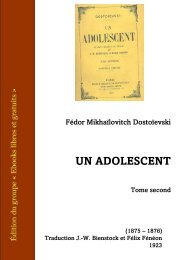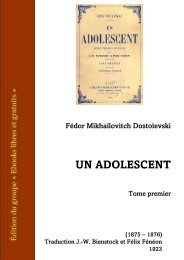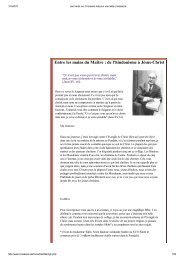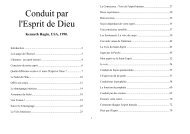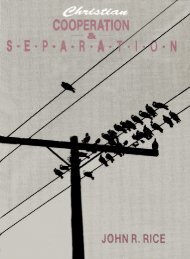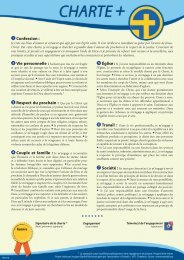- Page 1 and 2: Duco Hellema | Cees Wiebes | Toby W
- Page 4 and 5: The Netherlands and the Oil Crisis
- Page 6 and 7: Contents Foreword 9 1 War in the Mi
- Page 8: 7 From Copenhagen to Washington 191
- Page 11 and 12: Yet the affair of the oil embargo w
- Page 13 and 14: his advice; and to extend thanks to
- Page 15 and 16: After about four days, however, eve
- Page 17 and 18: Early in 1973, Moscow decided to su
- Page 19 and 20: nel carriers, the m-113’s; Israel
- Page 21 and 22: tion (dgis). This arose from the fa
- Page 23: Military Support As we said earlier
- Page 27 and 28: consultation with Britain. It was t
- Page 29 and 30: ing and Stemerdink subsequently alw
- Page 31 and 32: Each of the 707’s would have made
- Page 33 and 34: cences for the export of arms had b
- Page 35 and 36: Foreign Ministry; for the whole aim
- Page 37 and 38: draft declaration was drawn up that
- Page 39 and 40: West European allies. When the new
- Page 41 and 42: had never asked his Defence Ministe
- Page 43 and 44: pendence on imports was far less th
- Page 45 and 46: that would call for extra capital i
- Page 47 and 48: ut these need not be insuperable. T
- Page 49 and 50: necessary, together to prepare step
- Page 51 and 52: ters. W.J.G. Gevers, the Ambasssado
- Page 53 and 54: he was not favourably impressed by
- Page 55 and 56: League’s Boycott Bureau the very
- Page 57 and 58: haps diplomatic steps might procure
- Page 59 and 60: and Oman, Wagner said he would be g
- Page 61 and 62: In Cairo, Dutch Ambassador F. Von O
- Page 63 and 64: go, though other reports seemed to
- Page 65 and 66: It was soon clear, however, that De
- Page 67 and 68: can buyer, so long as they were pre
- Page 69 and 70: understanding of the Arab side and
- Page 71 and 72: oycott demanded by Syria. The Jorda
- Page 73 and 74: a purely political sanction against
- Page 75 and 76:
the embargo in place against The Ne
- Page 77 and 78:
heads of state and government leade
- Page 79 and 80:
certain degree of solidarity was ca
- Page 81 and 82:
to it, Heath had threatened, by iss
- Page 83 and 84:
legal form of this agreement was no
- Page 85 and 86:
also the usa played a ‘delaying
- Page 87 and 88:
Lynden emphasized that the Dutch ef
- Page 89 and 90:
ners in the ec should come to some
- Page 91 and 92:
could be ‘linked’ to a common e
- Page 93 and 94:
the embargo against Rotterdam and t
- Page 95 and 96:
nerable position which, according t
- Page 97 and 98:
those involved in Economic Affairs
- Page 99 and 100:
Defence, Finance and Development Co
- Page 101 and 102:
pendent on the supply of crude oil.
- Page 103 and 104:
therefore prepared to request the o
- Page 105 and 106:
that The Netherlands’ ec partners
- Page 107 and 108:
Sunday, November 4. The following d
- Page 109 and 110:
foreign motorists (to whom the Sund
- Page 111 and 112:
places between the oil companies an
- Page 113 and 114:
ution by rescheduling to Rotterdam
- Page 115 and 116:
The Co-ordination Group Slowly, The
- Page 117 and 118:
plies of petroleum to market garden
- Page 119 and 120:
ier in their own country. They were
- Page 121 and 122:
Various offers were also arriving i
- Page 123 and 124:
out on July 6 in Algeria on the ass
- Page 125 and 126:
views of the First Chamber, Den Uyl
- Page 127 and 128:
clarification of the November 6 sta
- Page 129 and 130:
At the time, however, the Conservat
- Page 131 and 132:
In the context of Europe, the epc m
- Page 133 and 134:
omy. Lubbers contested this. He sai
- Page 135 and 136:
Lubbers and Van Lynden therefore we
- Page 137 and 138:
Indeed, there were even more doubts
- Page 139 and 140:
exactly this Summit should have and
- Page 141 and 142:
the Rotterdam-Antwerp pipeline to s
- Page 143 and 144:
isterial session of November 5 and
- Page 145 and 146:
aside. Nor did it look as though th
- Page 147 and 148:
while providing no guarantees for t
- Page 149 and 150:
The visible hand was therefore whol
- Page 151 and 152:
Copenhagen The Summit began on Dece
- Page 153 and 154:
not been rejected, and, furthermore
- Page 155 and 156:
of The Netherlands, West Germany, D
- Page 158 and 159:
6 Rationing In this chapter we shal
- Page 160 and 161:
companies wanted Economic Affairs t
- Page 162 and 163:
istry of Economic Affairs on the ba
- Page 164 and 165:
25%, and for this reason Lubbers th
- Page 166 and 167:
figures over oil supplies was conce
- Page 168 and 169:
The Dutch Cabinet blamed the Britis
- Page 170 and 171:
had directed member states to lay i
- Page 172 and 173:
position, the Dutch Cabinet was the
- Page 174 and 175:
nomic Affairs, but would have to wa
- Page 176 and 177:
In the spring of 1973, differences
- Page 178 and 179:
erably), possibly requiring the int
- Page 180 and 181:
Analysing this policy - if policy i
- Page 182 and 183:
The majority of the Cabinet, for a
- Page 184 and 185:
last beyond three weeks. There were
- Page 186 and 187:
‘that maintenance of the ban on s
- Page 188 and 189:
Garage Owners (bovag), and a prosec
- Page 190 and 191:
scarcely encouraging. In that month
- Page 192 and 193:
7 From Copenhagen to Washington In
- Page 194 and 195:
comed the American initiative. Amer
- Page 196 and 197:
the suggestion of the Shah of Persi
- Page 198 and 199:
among other countries that hitherto
- Page 200 and 201:
parent that Parisian governing circ
- Page 202 and 203:
send a mission, led by Vice Premier
- Page 204 and 205:
from normally available quantities.
- Page 206 and 207:
ers’s construction of the situati
- Page 208 and 209:
Ministers’ job would be to put to
- Page 210 and 211:
Van der Stoel’s earlier circular,
- Page 212 and 213:
ility with regard to relations with
- Page 214 and 215:
the Director-General for Political
- Page 216 and 217:
energy problems in a special sessio
- Page 218 and 219:
Lubbers disagreed. In his view, the
- Page 220:
Pronk should follow the argument of
- Page 223 and 224:
to achieve international redistribu
- Page 225 and 226:
The Cabinet based its position on r
- Page 227 and 228:
with what it considered unjust disc
- Page 229 and 230:
eginning involve both producer coun
- Page 231 and 232:
French there were two major problem
- Page 233 and 234:
sembly, generating the impression t
- Page 235 and 236:
logue further, agreeing, at least a
- Page 237 and 238:
that the epc chairman should be ent
- Page 239 and 240:
his interlocutor from the West Germ
- Page 241 and 242:
The appended text was in his view c
- Page 243 and 244:
We have to try to provide a realist
- Page 245 and 246:
Permanent Representative stressed t
- Page 247 and 248:
divided’. 69 It was also clear fr
- Page 249 and 250:
To the End The oapec decision of Ju
- Page 251 and 252:
point in pursuing a dialogue with t
- Page 253 and 254:
Within the Den Uyl government in Th
- Page 256 and 257:
Conclusion In many respects, The Ne
- Page 258 and 259:
the Dutch policy over the Middle Ea
- Page 260 and 261:
The Dutch oil interests were of cou
- Page 262 and 263:
place with the support of the usa a
- Page 264 and 265:
had primacy in matters internationa
- Page 266 and 267:
Notes Notes Chapter 1 1 nmfa, Embas
- Page 268 and 269:
35 Every American embassy houses a
- Page 270 and 271:
83 nova interview with Van der Stoe
- Page 272 and 273:
24 nmfa, BZ-rapport Oliecrisis, Vol
- Page 274 and 275:
68 nmfa, Code 913.211.0, Folder 570
- Page 276 and 277:
12 nmfa, BZ-rapport Oliecrisis, Vol
- Page 278 and 279:
66 ‘The use of the oil weapon spe
- Page 280 and 281:
47 Grünfeld, 1991, p. 93. Grünfel
- Page 282 and 283:
32 nmfa, Code 913.211.0, Folder 570
- Page 284 and 285:
85 nmfa, BZ-rapport Oliecrisis, Vol
- Page 286 and 287:
15 KMP, Cabinet meetings, minutes o
- Page 288 and 289:
60 nmfa, BZ-rapport Oliecrisis, Vol
- Page 290 and 291:
4 nmfa, Code 614.51, Folder 7806, a
- Page 292 and 293:
53 nmfa, Code 913.211.0, Folder 570
- Page 294 and 295:
14 nmfa, Code 913.211.0, Folder 570
- Page 296 and 297:
73 nmfa, Code 912.2, Folder 1013, D
- Page 298 and 299:
Archival Records A large number of
- Page 300 and 301:
g 165 Modern Military Field Branch
- Page 302 and 303:
List of Acronyms and Terms aaw aaz
- Page 304 and 305:
oapec ofe opec pa plan plo ppr psp
- Page 306 and 307:
Boon, H.N., Afscheidsaudiëntie. Ti
- Page 308 and 309:
International Economic Report of th
- Page 310 and 311:
Conflict, 1967-1976, Berkely: Unive
- Page 312 and 313:
Newspapers Algemeen Dagblad Elsevie
- Page 314 and 315:
Index of Names Abdessalam, B. 131,
- Page 316 and 317:
Rashid al Rashid, A. 64, 227 Renard
- Page 318 and 319:
European Monetary Union 141 Europea
- Page 320 and 321:
Shell 9, 10, 40, 46, 51, 53, 55-58,







